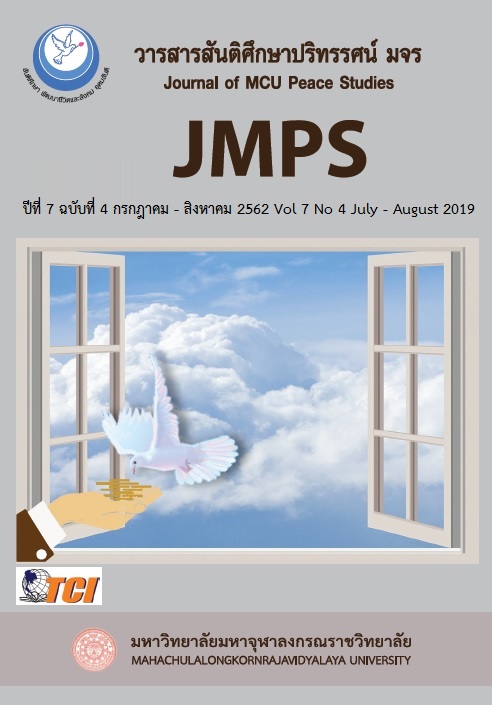การตีความพุทธภาวะเชิงอัตวิสัยที่มีผลต่องานวรรณกรรม สำคัญของพระอัศวโฆษ
Main Article Content
บทคัดย่อ
อัตวิสัยเชิงวรรณกรรมเกิดจากฐานการมองความจริงเชิงจิตนิยมสัมบูรณ์ ทำให้การคิดเกี่ยวข้องกับ โลกแห่งปรากฏการณ์กลายเป็นสื่อ (เครื่องมือ) โดยอาศัยเนื้อหาที่เป็นปรมัตถสัจกับพุทธประวัติ ซึ่งถือเป็น อนุตริยะด้านสมมติสัจ เพื่อนำไปสู่จิตที่สมบูรณ์ ก่อให้เกิดรสทางสุนทรียธาตุกับจิต สื่อที่กระทบกับจิตมาก ที่สุด คือ วรรณกรรม ซึ่งเป็นเรื่องราวเนื้อหาที่จิตมีการประมวลและส่งผลทันทีกับจิต ลักษณะวรรณกรรม เชิงจิตวิสัยมีผลต่อการสร้างศีลธรรมที่มีฐานจากสัจธรรม งานวรรณกรรมของพระอัศวโฆษได้สร้าง สุนทรียภาพเชิงกุศลจิตให้กับมโนภาพได้อย่างยอดเยี่ยม วิธีการดังกล่าวเกิดจากการหยั่งรู้ความเป็นปรมัตถ ธรรมของจิตแบบเอกภาพสมบูรณ์ของพระพุทธศาสนา จนส่งผลให้วรรณกรรมของพระอัศวโฆษได้รับความ นิยมอย่างสูงยิ่ง ไม่มีเรื่องราวพระพุทธประวัติใดงดงามยิ่งกว่าแม้กระทั่งปัจจุบัน
Article Details
ทัศนะและความคิดเห็นที่ปรากฏในบทความในวารสาร ถือเป็นความรับผิดชอบของผู้เขียนบทความนั้น และไม่ถือเป็นทัศนะและความรับผิดชอบของกองบรรณาธิการ ยินยอมว่าบทความเป็นลิขสิทธิ์ของวารสาร
เอกสารอ้างอิง
Johnston, E.H. (1936). Introduction. Acts of Buddha. Part II. Calcutta.
Hakeda, Y.S. (1967).The Awakening of Faith: Attributed to Asvaghosha. New York: Columbia University Press.
King, S.B. (1992). Buddha Nature. Delhi: Sri Satguru.
Mahachulalongkornrajavidyalaya University. (1996). Tripitaka: Thai version. Bangkok: MCU Press.
Phra Srīgambhīrañāṇ (Somjin Sammāpañño). (2013). Buddhist philosophy. Bangkok: MCU Press.
Bharadwaj, R. (2007). Vajrsuci of Asvaghosa and Concept of Varnajati through the Ages. Delhi: Vidyanidhi Prakashan.
Studstill, R. (2008). Buddhist Egoism and Other Infelicities a response to Paul Williams’ Christian Interpretation of Buddhism. Ars Disputandi. Volume 8. 22.
Phantharang, S. (2000). Mahayana Buddhism. 4th edition. Bangkok: Health Mind Publisher.
Manavithoolama, S. (1971). scripture of Lalitavisatra: Buddha’s biography Mahayana Bangkok: The Fine Arts Department.
Suzuki, T. (1900). Awakening of faith into Mahayana. Chicago: The Open Court pub. Co.
Inthasara, V. (2007).The essence of Mahayana philosophy. 2nd Edition. Bangkok: Thammadar Publisher.
Winternitz. (1972). A History of Indian Literature. U.S.A.


